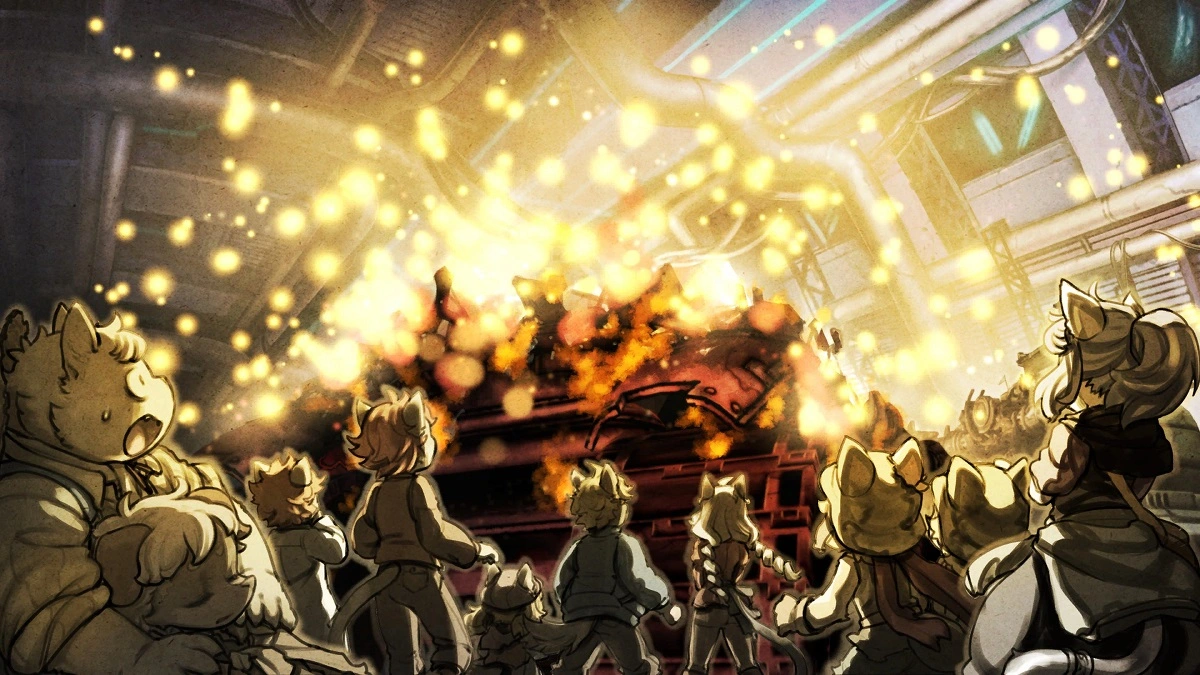Back to the Little Tail Bronx
2021年の『フーガ:メロディーズ・オブ・スティール』の続編は見られないような気がした。まず第一に、それはかなり決定的に終わりました。売り上げもそこそこしかなく、サイバーコネクトは1998年の『テイル・コンチェルト』以来、『リトル・テイル・ブロンクス』シリーズをヒットさせようとして失敗してきたように感じられる。しかし、ここにきてフーガ:メロディーズ・オブ・スティール2が登場する。
I couldn’t be happier. The original Fuga was a surprisingly well-executed design that got a lot of mileage from what could be considered very simple mechanics. So, how do you expand on that? What can you do to improve what has already been polished to such a gloss?
Fuga: Melodies of Steel (PC, PS4, PS5 [Reviewed], Xbox One, Xbox Series X|S, Switch)
Developer: CyberConnect2
Publisher: CyberConnect2
Released: May 11, 2023
MSRP: $39.99
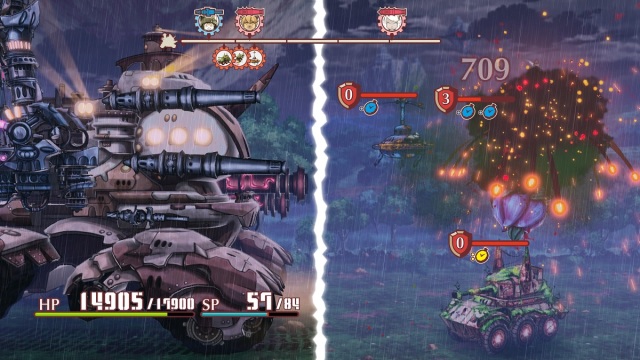
Taking place one year after the events of the first game, 風雅 鋼鉄の旋律2 sees the children reunite. However, before they even have time to catch up with one another, an ancient evil is re-awakened, a friend of theirs is killed, and they’re left chasing a new foe. Surprisingly, even though the kids still find themselves at the wheel of the giant Metal Slug-like Taranis, the plot manages to be mostly different.
In particular, I like the way 風雅 鋼鉄の旋律2 improves on its cast. While the children are all still children, one year is an eternity when you’re pre-teen. They’ve all grown from their experiences during the war and now have new strengths and insecurities. Characters who I maybe didn’t love in the first game, like Jin and Wappa, are given the chance to shine anew. Likewise, two boss characters from the previous title make their way aboard the Taranis, and in the new light of their diminished status, they add a nice flavor to the happenings on the tank.
That said, the narrative still has some of the same problems as the first game. The overarching plot seems to be stretched out to accommodate character growth. This time, it has trouble focusing on any significant event. Something happens to shake things up, and then it’s quickly resolved, and we move on. It’s definitely not terrible, but it’s not as interesting as the previous story, and that one was already not spectacular, to begin with.
That’s a big metal slug
The gameplay is more-or-less remixed rather than changed. Each of the characters has been gutted of their old skills, and they get an entirely new set of them. Once again, they commandeer either a machine gun, grenade launch, or cannon on the Taranis, and they may have something different this time around.
There are more widespread changes. The grenade launcher, for example, is where you’d commonly find the attacks that hit multiple targets in the first game. In 風雅 鋼鉄の旋律2, these are spread out across the machine guns and cannons. The changes don’t make the game dramatically different, but they do mean that you’ll need to adopt new strategies to succeed.
The enemies have also been tweaked. While the enemy was defeated in the previous title, you still largely fight their tanks. This (along with many other questions raised at the beginning of the game) isn’t initially addressed, but you eventually do find out why you’re fighting zombie tanks. But while they’re the same old machines of war, various mutations within them mean that they have a lot of new tricks up their sleeve. Overall, there’s more variety here, even if some of the units are quite familiar.
Powered by a forsaken child
Perhaps the most harrowing difference is with the Soul Cannon. In Fuga: Melodies of Steel, you could chamber a child in this massive metal appendage and destroy anything in your path with a single blast of terminated innocence. However, doing so would net you one of the less satisfactory conclusions to the game. Less tragically, it would kill the child.
That wouldn’t cut it for 風雅 鋼鉄の旋律2. You’ve already had one game to build up your skills, and it’s less likely you’ll need to lean on a “get out of failure-free” card. Now, if you find yourself on a losing trajectory – say, your health drops below 50% in a boss battle – the Taranis will select a child at random to load into the cannon. You then have 20 turns to finish the battle, or that child gets a one-way ticket to the other side of your opponent.
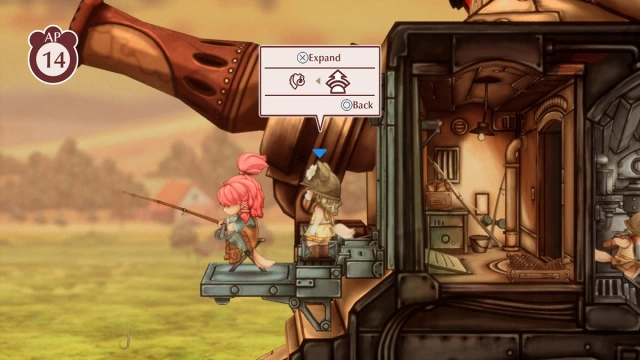
To offset this, the Taranis also has access to the Managarm, which uses children as ammunition. However, the Managarm only leaves the child injured and isn’t a guaranteed win like the Soul Cannon. It also means you don’t get experience points from the battle you used it in, but it might be better than having to scrap unrealized potential off the wall.
Unconventional ammunition
You’ve probably figured this out already, but it’s best if you play Fuga: Melodies of Steel before moving on to the sequel. There’s a recap available if you want to know what happened in the first game, but 風雅 鋼鉄の旋律2 works more as a continuation of the story rather than a completely new entry in the series.
To that extent, 風雅 鋼鉄の旋律2 might be a bit too conservative when it comes to advancing forward. Many of the assets are completely recycled, which I don’t usually count as a bad thing, but they’re not repurposed, just reused. So, many of the stages take place in the same areas of the first game, and the backgrounds feel mostly unchanged. Aspects of the game have been touched up but otherwise left the same. I feel like the intermissions and the plumbing of ruins for loot could have been completely revamped just to give players something fresh to do, but they weren’t. They feel the same.
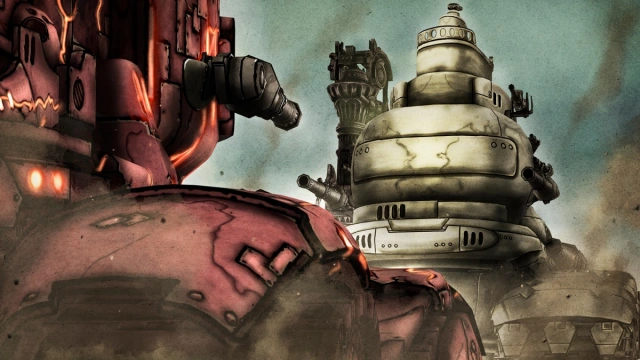
To be fair, I played the two games back to back and didn’t really feel bored or underwhelmed. There’s an extreme sense of deja vu in 風雅 鋼鉄の旋律2, but the core gameplay still proves to have longevity beyond its simple mechanics.
I have mixed feelings about how similar it is to the previous game. For one thing, the $39.99 asking price – while reasonable when you consider the length and quality of the game – feels like a lot when held up to its contemporaries in the small-budget space. On the other hand, if cutting corners was needed just to allow the series to continue, then I’m all for it.
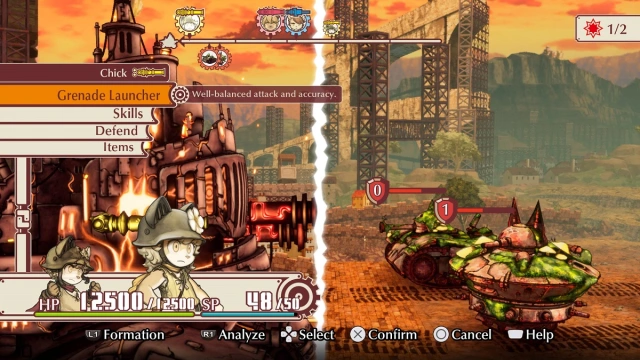
Old friends
That’s the most important thing to keep in mind: 風雅 鋼鉄の旋律2 is a continuation of the first game. While it remixes a lot of things to give you a fresh experience, nothing has been overhauled or upgraded to give you something new. If you wanted more Fuga – and who could blame you? – then that’s what you’re getting here. However, if you didn’t enjoy the first title, then there’s no hope for you here.
Yoann Gueritot, one of the directors who has now moved on to Platinum Games, has stated that Fuga is planned as a trilogy. I’m definitely on board with that, but I also kind of wish the series was doing more to earn that. A cohesive series of games is fine, but I prefer to see things evolve, expand, and reach for perfection as CyberConnect2 soldiers on. 風雅 鋼鉄の旋律2 is complacent. It’s great, but we’ve already seen its greatness. Eventually, it’s going to need to load something new into its cannon if it wants to get its dazzle back.
